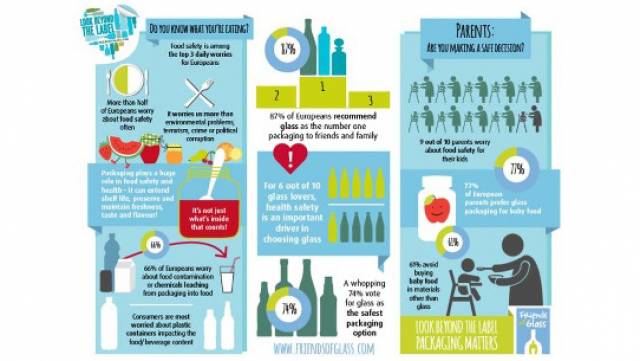According to recent research, European citizens are more worried about health and food safety than environmental problems, and packaging in food safety is a key concern. Glass packaging will meet the most stringent of any future EU food contact standards and regulations because glass is chemically inert, meaning that it does not interact with its contents and is impermeable to external contaminants.
Independent research conducted with 8,000 consumers reveals that Europeans are more worried about health and food safety than environmental problems, international terrorism or public safety; the role of packaging in food safety is amongst a list of key concerns.
The findings unveil a growing concern amongst European consumers linked to the potential health risks of chemical compounds leaching into food from packaging. Two thirds (66%) of consumers admit that they are worried about food contamination, as well as the risk of chemicals leaching from food packaging into its content.
Eight out of ten consumers surveyed believe these chemical interactions could be a risk to human health. The findings also reveal that European consumers (60%) are most worried about plastic containers impacting the food/beverage content or ingredients out of all materials surveyed including metal, cartons, bag in box, plastics and glass.
Health concerns play a key role in consumer decision making, and in driving demand for food or beverages packed in glass. Among those who opt for glass, 61% trust it as the safest packaging for their health. This compares with 48% of consumers surveyed in 2010.
Commenting on behalf of the Friends of Glass Community, Adeline Farrelly – Secretary General of FEVE, the European Container Glass Federation states: “It is clear that consumers worry about contamination from packaging. Nowadays, consumers are looking at how products are stored and packaged – not only at what’s written on the label. Studies show packaging materials are leaking chemicals into food; which is a very real concern. Parents of young children are particularly cautious: 77% of European parents prefer glass for storing baby food, while 61% avoid buying baby food in plastic bottles or other materials.”
Commenting on the existing body of scientific research that has examined migration of chemicals from packaging materials, Professor Dieter Schrenk, an expert in Pharmacology and Toxicology at the University of Kaiserslautern, Germany states: “The issue of transfer of food packaging material-borne compounds into the food is important. Here, plastic polymers, metals and paper/cardboard have been shown in the past to be a relevant source for unwanted chemicals in food. These occur via migration of mostly intentionally added or process-related constituents. Although the risk of exposure towards food contaminated with such compounds is considered as low, more research is needed to clarify this issue scientifically.”
Adeline Farrelly continued: “To avoid unwanted contamination from packaging, particularly when making important decisions such as during the weekly family shop, consumers should ‘look beyond the label’ – not only at a product’s ingredients but also at what form of packaging they are buying. An increasing number of Europeans surveyed (87% compared to 74% of those surveyed in 2010) recommend glass as their number one packaging choice for food or beverages. This clearly demonstrates consumers trust glass as one of the most pure and inert materials.”
Glass is the packaging material which acts as a natural and impermeable barrier; it does not interact with food and drink products. In the US, glass is the only widely-used packaging material considered “GRAS” or “generally recognized as safe” by the US Food and Drug Administration. In 2011, when banning the use of BPA for plastic baby bottles, the EU recommended glass as a safe alternative for human health.
The EU Commission is strengthening legislation related to chemicals which leach out of food packaging. Glass packaging will meet the most stringent of any future EU food contact standards and regulations because glass is chemically inert, meaning that it does not interact with its contents and it is impermeable to external contaminants.




